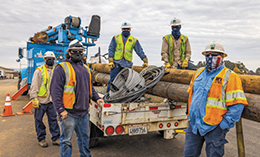
A YEAR LIKE NO OTHER
For most of us, the pandemic of 2020 has transformed our lives. Commutes, gone. Offices, gone. Drop-offs at school, gone. Sadly, too often loved ones gone as well.
But one of the most remarkable aspects of the COVID-19 pandemic for the members of the IBEW was how often and how often we were called on to maintain stability and provide the foundation that kept life and the rest of the economy from collapsing.
For the last 12 months, our members have made it possible for millions of people to work and study from home. The data centers that made billions of video calls possible were built with our hands. The hospitals, permanent and temporary, were built with our hands. Overnight, the 100-year-old model of where and when power is consumed changed completely — offices never lit up, houses never went dark — and we handled it without skipping a beat.
Someone out there coined the term, "The International Brotherhood of Essential Workers," and it stuck.
It has been a full year since much of North America saw offices and schools shutter. For most of the members of the IBEW, work didn't stop. Our jobs changed. Policies changed. The people we work with changed along with the shape of daily life. But it was still our work, and we did it with pride and a renewed commitment to safety.
And we did the unhappy, necessary work at the darker edges of the pandemic. We built the field hospitals in parking lots and fairgrounds and convention centers. We wired the temporary morgues because it had to be done and we were the ones able to do it.
When work needed to be done, we stepped up. We slept in trailers on parking lots outside grid operation centers.
When we traveled hundreds of miles for mutual assistance work after hurricanes or major storms, we slept in our trucks. We ate alone.
We did it because our families depended on us. Our neighbors depended on us. We did it because it was our job.  |
 Print
Print  Email
Email
